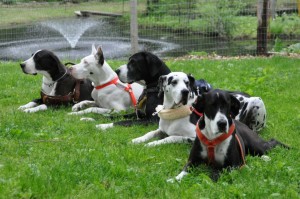Article by Evans
Boxer Dog Care And Health Tips
If you own a boxer, then you know that owning a dog is a lot of responsibility. A lot of the times, the person that is looking for a puppy just wants a cute pet and forgets about all of the things he will have to do to take good care of puppy. Boxer dog care isnt just feeding your dog regularly and going out on daily walks, there is much more to it than that. You will have to take care of things like training, grooming, exercising, diet and a lot more if you want your boxer dog to be happy and healthy. Here are some basic tips to help you take care of your beloved boxer dog.
Boxer Dog Care: Grooming
boxer-dog-layingBoxer dogs don’t require too much care in the grooming department, but there are still some responsibilities that you will have to take care of. Boxers take pretty good care of their own coat but you will still need to wash them when they get too dirty or start to smell like a sweaty dog. Another thing you can do help your boxer take good care of their coat is brush it two to four times a month. Be sure to brush your dogs coat outside so all the loose hair stays out and not inside on your clothes and furniture.
After a good bath, be sure to clean out your dogs ears. The best way to take care of their ears is to use a clean cotton ball when you clean them instead of a q-tip. Your boxer most likely won’t be too happy about you poking around in their ear and will give you a hard time. With all the moving around, you might accidentally poke your dog with a q-tip. It’s also easier to clean your dog’s ears with a cotton ball because q-tips are designed for the small human ear and dog’s ears are much larger.
Washing and cleaning is a must and probably seems like common sense to most dog owners when it comes to taking care of their dogs, but dental hygiene is often forgotten. Just as humans need to brush their teeth and clean them regularly, dogs need to dental cleaning as well. No that doesn’t mean you have to take your boxer to the dentist for regular checkups, but it does mean that you should brush your dogs teeth once or twice a week. You should also get your boxer minty bones to chew on to keep his breath smelling fresh.
Boxer Dog Care: Exercise
A topic that doesn’t usually come up when talking about boxer dog care is exercise. This however is extremely important if you want your boxer to be happy and healthy. Boxers were bred as hunting dogs and were running and chasing down prey constantly, so there is nothing that your boxer loves more than running around. So if you go on morning runs be sure to take your boxer with you.
Regular exercise can prevent some health problems and can keep the boxer in a great shape. If your boxer is overweight, giving a good diet and good amount of activity for your boxer is the best thing you can to take good care of him.
Boxer Dog Care: Health
When you ask yourself “How can I take care of my boxer dog?” or “What are some important boxer dog care tips?” chances are the first thing that comes to your mind is the well being of your dog. Your dog’s health is the most important part and the ultimate goal when you think of boxer dog care.
The basics of keeping your dog healthy are a good diet, fresh water and regular veterinary checkups. Each one is equally important when it comes to the boxer’s health. You need a good diet full of nutrients and vitamins so your dog can develop into a healthy and strong boxer dog. Fresh water is vital to any living organism including your boxer. Water keeps your dog hydrated and helps get rid of bacteria and other unwanted things in your dog. If you want your dog to be protected against diseases and viruses that are floating around, visiting the vet is essential. Veterinarians went to medical school to learn the best ways to keep your dog healthy and are specialized in animal health.
If you want your boxer to be healthy and happy, you will have to take care of a lot of responsibilities. Owning a dog isn’t easy, but all the effort is worth it. There is no better reward than knowing your boxer dog is happy and healthy.
I strongly recommend you read the Boxer Dog Owners Guide if you own a boxer. It’s a complete guide to owning a boxer with important information about health, diet, exercise, training, obedience and more. It is a must have for every boxer dog owner.



 Fact is, nobody really knows! I find that hard to believe, don’t you? But it’s true.
Fact is, nobody really knows! I find that hard to believe, don’t you? But it’s true. Scientists at the University of California, Davis hypothesised that a cat’s purr can be used as a healing mechanism to offset long periods of rest and sleep that would otherwise contribute to a loss of bone density. The vibrations and contractions of a purr work during both inhalation and exhalation show a consistent pattern and frequency between 25 and 150 Hertz; these frequencies have been shown to improve bone density and promote healing. Dr. Lyons, one of the leading scientists in this study, suggests that this finding may be applicable to astronauts during extended periods in zero gravity. Bone density loss and muscle atrophy is a serious concern for astronauts during extended periods at zero gravity. Since during these periods musculo-skeletal systems do not experience the normal stresses of physical activity, including routine standing or sitting, which requires strength for posture control, exposing these astronauts to sound frequencies similar to those of a cat’s purr could counteract the deteriorating effects of zero-gravity.
Scientists at the University of California, Davis hypothesised that a cat’s purr can be used as a healing mechanism to offset long periods of rest and sleep that would otherwise contribute to a loss of bone density. The vibrations and contractions of a purr work during both inhalation and exhalation show a consistent pattern and frequency between 25 and 150 Hertz; these frequencies have been shown to improve bone density and promote healing. Dr. Lyons, one of the leading scientists in this study, suggests that this finding may be applicable to astronauts during extended periods in zero gravity. Bone density loss and muscle atrophy is a serious concern for astronauts during extended periods at zero gravity. Since during these periods musculo-skeletal systems do not experience the normal stresses of physical activity, including routine standing or sitting, which requires strength for posture control, exposing these astronauts to sound frequencies similar to those of a cat’s purr could counteract the deteriorating effects of zero-gravity.